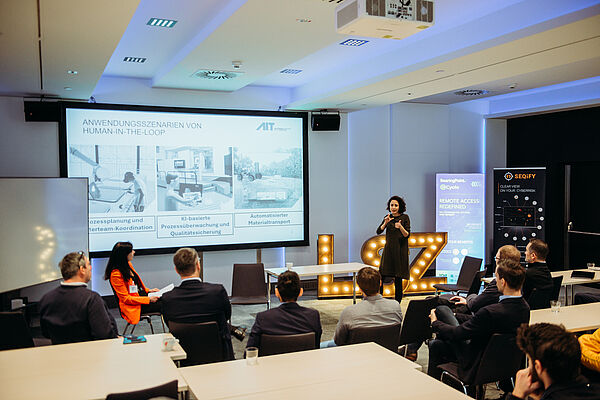The future of production is digital – but above all human-centered! At the ‘Production & IT’ conference in Linz on 13 March, human-machine-interfaces expert Setareh Zafari and marketing and digital manufacturing expert Christine Wahlmüller-Schiller presented innovative solutions for collaboration between humans and machines. In their workshop ‘Human-in-the-loop: Solutions for human-machine collaboration in the production of tomorrow’, they presented four pioneering innovation projects.
Four projects for the production of the future
- Autonomous logistics solutions: A high-precision, autonomous forklift truck transports pallets outdoors. Humans can intervene in the process via tablet, a special user interface or gesture control - for maximum flexibility and safety.
- AI-supported production optimisation: intelligent systems and humans take over the visual inspection of injection moulded parts and monitor production processes in order to detect errors at an early stage and minimise rejects.
- Process planning and robotics: In washbasin production, machines, robots and humans work together to ensure more efficient production. Optimum team coordination optimises the process.
- Quality assurance: The Zero3 project focuses on the development of data and AI-supported solutions for zero-defect manufacturing. The aim is sustainable, defect-free production. The AIT Centre for Technology Experience is playing a key role here. Find out more here: www.zero3.at .
All of these Human in the Loop (HITL) use cases show that close collaboration between humans and machines makes production processes safer, more flexible and more efficient. The challenge lies in the design and effective integration of human roles into automated systems. Intelligent systems that adapt to human working methods will create a future-proof industry in which people are not replaced but supported.
Industry 5.0: People remain at the center
While automation is playing an increasingly important role in modern production, it is clear that human intuition, creativity and problem-solving skills remain irreplaceable - especially in dynamic or complex production environments. HITL approaches integrate human cognitive skills and expertise to complement autonomous systems, making them more robust and adaptable.
This is exactly where Industry 5.0 comes in:
- Digitalisation meets the human factor
- Sustainability becomes an integral part of production
- New technologies support but do not replace human expertise
The combination of artificial intelligence, automation and human-centred design opens up new opportunities to increase efficiency, quality and flexibility in production. However, people remain the key success factor - especially when it comes to shaping change.



